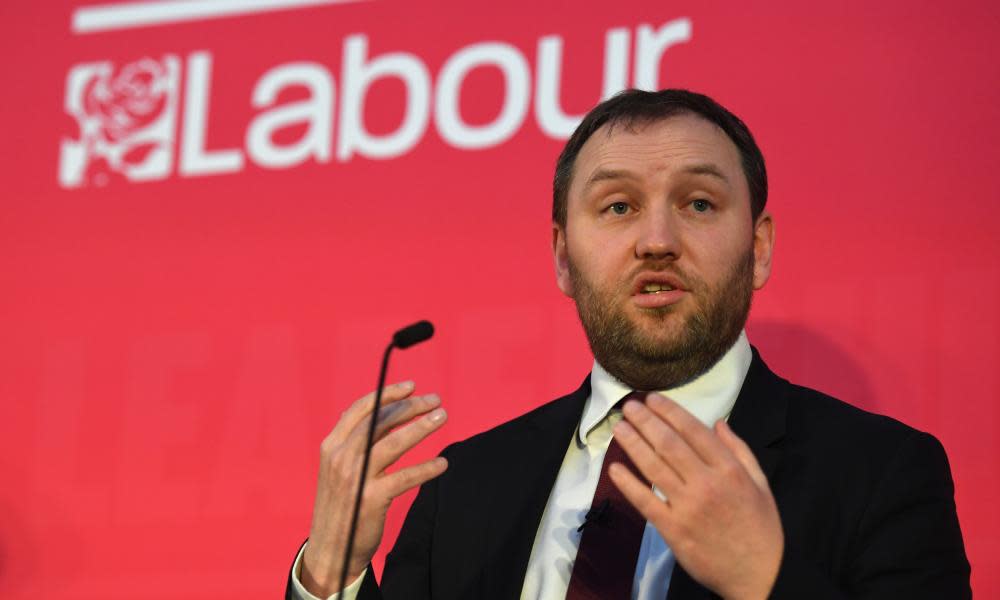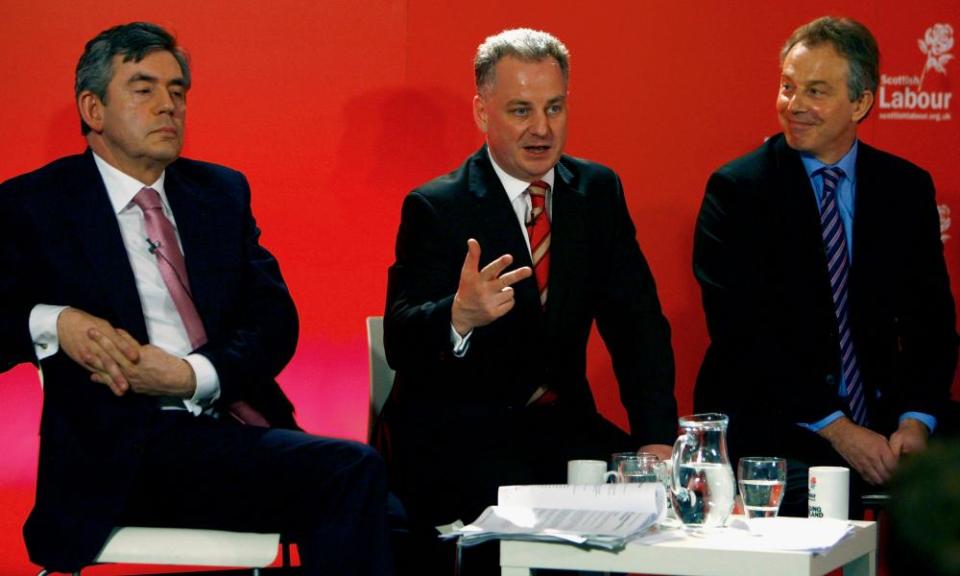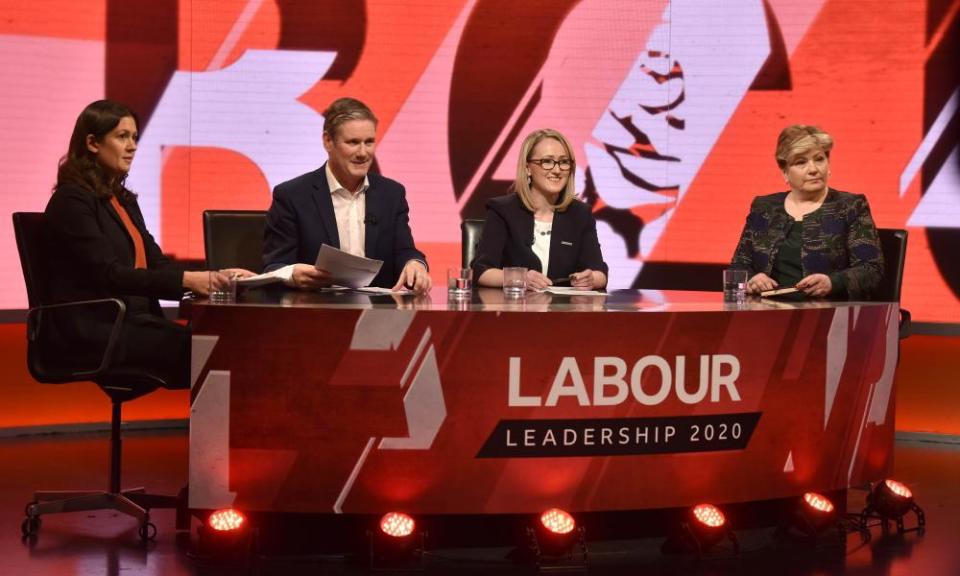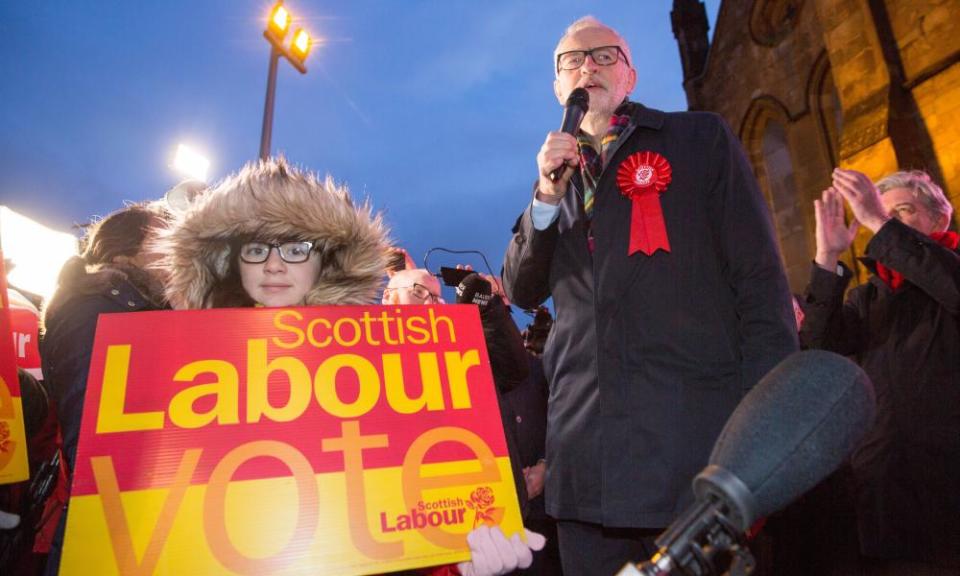Scottish Labour urges UK party to learn from fall of 'tartan wall'

When Labour saw its electoral hopes go up in smoke in so-called red wall seats, as voters in England who felt taken for granted, overlooked and left behind turned to the Conservatives, it was at first understood as an unprecedented catastrophe.
But the party had been facing a strikingly similar collection of challenges in Scotland for more than a decade – and the failure to deal with them was precisely what rendered the party so vulnerable to the south.
“It was the tartan wall before the red wall,” said Ian Murray, Labour’s only Scottish MP and the only Scot standing for the UK deputy leadership, before a hustings event in Glasgow.
He underlined that the party can only secure a majority at Westminster if it wins back its Scottish heartlands. “This is mathematical, not political: if Labour only return one Scottish MP in 2024, we have to win 124 seats elsewhere; that’s the scale. This is not a Scottish issue, it’s UK wide.”
As the Labour leadership candidates prepare for their only Scottish event on Saturday, Murray’s warning is not an isolated one. In interviews with the Guardian, he and a string of other influential party voices issued a dire warning to Jeremy Corbyn’s would-be successors that the party can only begin to rebuild if it learns the lessons from Scotland.
The Glasgow event takes place as Scottish Labour continues its own inquiry into last December’s dire election, which saw it polling 18.6% in its worst result in recent history. It marked a rejection of a confused position on Brexit and the constitution, hindered by a succession of damaging interventions from the UK leadership.

Only by facing the crisis head-on can the party begin on the long road back, argued the former first minister Jack McConnell. “For far too long, leaders and senior figures in [the] UK Labour party have been too tentative in their engagement with Scotland,” he said. “We need a UK Labour leader who understands identity and is committed to engaging with the Scottish Labour party.”
This reticence among leadership candidates may well reflect the practical consideration of the much lower party membership in Scotland, but also an ardent desire to avoid mis-steps. Early on, Murray warned the contenders not to come north of the border and talk about Scottish issues without attempting to understand them first. Already, Lisa Nandy has had to clarify her remarks that the UK should “look to Catalonia” for lessons on how to defeat Scottish nationalism, while Emily Thornberry apologised for telling a hustings that she hated the SNP.
Some also believe that the UK contest is pulling focus when Scottish Labour is concurrently holding its own deputy leadership contest between a moderate Holyrood veteran, the MSP Jackie Baillie, and the Corbynite Glasgow councillor Matt Kerr, both of whom claim to represent the change that the party desperately needs.
But McConnell, who said he was supporting Nandy in part because of her commitment “to speak to people who used to vote Labour but don’t any more”, believed that the challenges facing the party in the north of England and Scotland are “very, very similar”.
The Edinburgh Southern MSP Daniel Johnson agreed: “There are striking similarities in the interweaving of identity politics, disenfranchisement and metropolitan drift.”

Johnson, who resigned from Scottish Labour’s frontbench last May in protest at Jeremy Corbyn’s stance on Brexit, after the party slumped to a vote share of just over 9% in the EU elections, said he has been encouraged to hear the leadership candidates pick up on these “common threads”, as well as discussions about greater autonomy for the Scottish party and radical devolution.
All the leadership candidates have talked positively about federalism – “a word that sends folk to sleep”, warned one Scottish Labour reformer.
The Scottish Labour leader, Richard Leonard, who does not express any public preference in the UK contest, has lately taken up Gordon Brown’s formulation of “home rule”, but there has been deep frustration in Holyrood in recent years at the halting progress of the UK party’s promises to flesh out its constitutional policy.
Dame Pauline Bryan, the Corbyn ally tasked last year with writing a detailed paper on how federalism could work, has confirmed to the Guardian that her work is ongoing and that she intended to brief the candidates on the recommendations, which include, for Scotland, new borrowing powers, workers’ rights and the ability to diverge from the UK on drugs policy.
For the former MP Paul Sweeney, who lost his Glasgow North East seat to the SNP last December and is advising the deputy leadership candidate Angela Rayner, the task is urgent. “The new leader needs to spell out what [federalism] means, and have a clearly defined proposal before the 2021 Holyrood elections,” he said.

He added: “We can’t just stick it in a manifesto, we have to bring it out into communities. That was what was so transformational about the white paper on independence [that the Scottish government published during the 2014 referendum campaign]. We need to take our own version into those communities that voted yes and break the 45/55 impasse.”
With the SNP pressing for the powers to hold a second independence referendum, the spectrum of Scottish Labour opinion is clear about the need to offer voters a straight answer on the constitution on the doorstep that is “compatible and coherent” across the Scottish and UK parties, and will allow them to concentrate on the SNP government’s faltering record on public services. And some ousted MPs believe that this clarity, coupled with the election of a more credible UK leader, could prompt the relatively small swings back to Labour required to re-take cities like Glasgow.
Related: Scottish Labour must argue for an independence referendum – or be punished again | Rory Scothorne
There are plenty within Scottish Labour, including Murray and Baillie, who remain implacably opposed to a second vote, but others – including those younger activists who voted yes in 2014 but were then attracted by Corbyn’s socialist manifesto – believe that to survive the party must engage with the public mood. Three recent polls have put support for independence above 50%, while the public sector union Unison added to this sense of momentum when its Scottish council voted to back calls for a second referendum at the start of this month.
Both Keir Starmer and Rebecca Long-Bailey have suggested that they would not block a second referendum if there was a Holyrood mandate for it in 2021, resulting in accusations that they were promoting votes for the SNP.
Following reports in early January that Leonard was considering backing a second independence referendum with a pro-federal option on the ballot paper, the Scottish executive rejected their leader’s proposal to discuss it at an open conference with the membership.
Monica Lennon, Labour’s shadow Scottish health secretary, has spoken out about the party’s need to consider the democratic case for a second referendum as well as the possibility of Scottish Labour breaking away from the UK party. “It’s in no one’s interests for the 2021 Holyrood election to be a proxy independence referendum, when so much else is at stake,” she said.
“That’s why I believe Scottish Labour needs to refresh our policy on independence and the constitution soon, well ahead of the election. The trade union movement in Scotland is doing exactly that and Scottish Labour must engage in that debate, giving all of our members a say, even if that is an uncomfortable debate.
“We need to be bold and brave and confident in our own position, before we can get a fair hearing with voters. Of course there are different opinions within Scottish Labour, with some people remaining strongly opposed to a second referendum forever, but I don’t think that necessarily reflects the wider party or the country.”

 Yahoo News
Yahoo News 
